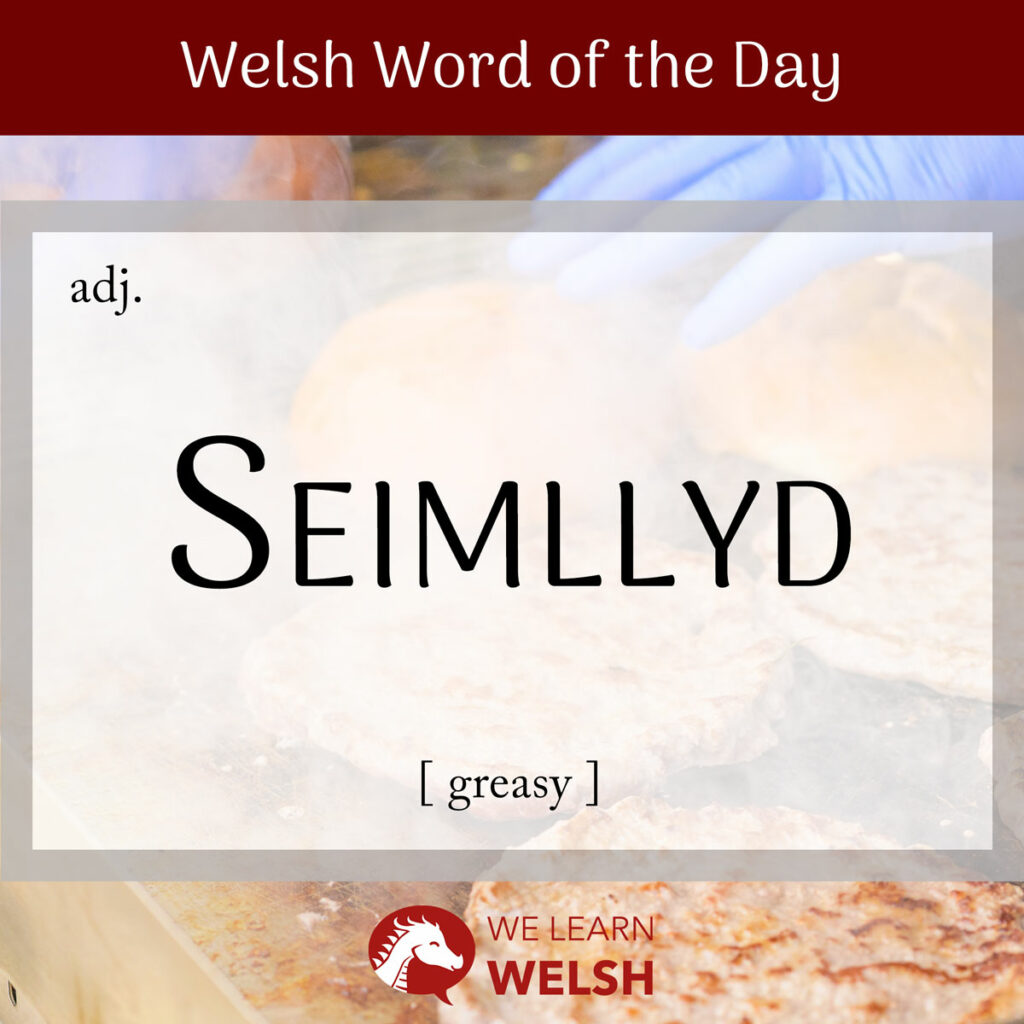Today’s Welsh word of the day is unfortunately a rather yucky one! We’re going to discuss the word seimllyd, literally meaning fatty. But it’s often used in a more general sense to refer to a greasy texture, or metaphorically to mean a smarmy person, like oily in English.
seimllyd
greasy
This adjective can’t mutate, and you also don’t need to alter it at all based on the gender or number of the noun it describes.
The fact that seimllyd sounds a bit like the English word slime is pure coincidence. It actually comes from the noun saim, meaning grease or fat of the kind that’s used in cooking. Seimlyd is a common variant – you can use either and people will understand what you mean just fine.
As with most adjectives, seimllyd has many synonyms, all with slightly different connotations. For example, you could also describe a food that is fatty, greasy or oily as brasterog or simply bras. You could even use greshlyd, a corruption of the English that’s common in South Wales.
Ych a fi – mae’r byrgyr ma’n ofnadwy o seimllyd.
Yuck – this burger is really, really greasy.
Generally, the words bras and brasterog would be used to describe foods like creision (crisps) that have a high fat content but aren’t particularly greasy to touch. It would have to actually feel oily to earn the descriptor seimllyd – which might not be that appetising!
Sglodion (chips) are a common culprit of being quite seimllyd, or really anything wedi ffrio (fried) in olew (oil) or menyn (butter). It’s a fine balance between making the bwyd (food) nice and blasus (tasty) without going overboard and creating something afiach (disgusting).
If you do want to complain about some bwyd being a bit on the seimllyd side, you could say mae blas seimllyd arno or mae blas saim arno – both of these mean it tastes greasy.
The other thing that can easily become seimllyd is your own croen (skin) and gwallt (hair)! Some people’s tends to be more sych (dry), whereas others are more on the seimllyd side. Balance is key, and many people use special kinds of sebon (soap) or siampŵ (shampoo) to maintain health and hygiene.
Although seimllyd is sometimes used in a similar way to the word slimy in English, this is just as an extension of its meaning as greasy. Something that you would exclusively describe as slimy and not greasy, like a llyffant (toad), is better called llysnafeddog (slimy, snivelly, covered in mucus).
And if you were talking about something that’s actually covered in some kind of slime, lleidiog or mwdlyd, both meaning muddy, are your best options.
Mae fy wyneb yn teimlo’n seimllyd iawn heddiw.
My face feels really greasy today.
A common synonym for a slimy, smarmy person is sebonllyd. This literally means soapy – you can read our article on sebon (soap) and all its connotations in Welsh here. People of this type have the tendency to seboni (literally to soap, figuratively to flatter and fawn) and generally act in a way that is ffuantus (hypocritical, disingenuous).
Can you try using seimllyd in a sentence? Give it a go!


